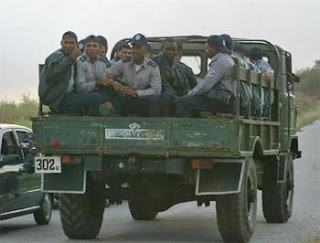 |
| Hundreds of students protesting outside the movie theater "Camilo Cienfuegos" in Santa Clara. |
The regime faces the prospect of further discontent in the run-up to April’s Communist Party congress, the first since 1997, as the authorities need to reform a stagnant economy and bloated public sector without undermining the austere security that underpins the ruling party’s base of support.
The streets of the eastern city of Bayamo have been blocked for two days by horse-drawn carriage drivers protesting against tax increases. Hundreds of students in Santa Clara reacted violently when the communist authorities broadcast a documentary instead of the Barcelona-Real Madrid soccer game they had paid to see.
The unrest is “totally unprecedented,” says Orlando Gutierrez, national secretary of the Directorio Democratico Cubano, who notes that while the strikers and students’ actions were provoked by specific grievances, they soon became politicized.
The students initially protested over the switch in program, but “by the end they were calling for the downfall of Castro and the end of the regime,” he said, and some of the strikers in Bayamo have reportedly claimed to be inspired by Orlando Zapata Tamayo, a prominent dissident who died following a hunger strike earlier this year.
Bayamo is politically symbolic as the city in which Cuba’s wars of independence started in 1868.
The current ferment began on 30th November 3o, says Gutierrez, when the National Civic Resistance Front, led by Jorge Luis Garcia Pérez – aka “Antúnez” (left) organized a banging of pots and pans to mark the anniversary of the abortive 1956 uprising against Fulgencio Batista’s dictatorship. The protest reportedly spread across the island to six main cities.
The unrest “could become a critical threat to the Raúl Castro regime, which fears spontaneous protest far more than organized activism,” The Miami Herald notes. “While few Cubans are interested in politics, issues over transportation and food could serve as a lightning rod for a fed-up populace eager for change.”
Bayamo is politically symbolic as the city in which Cuba’s wars of independence started in 1868. Some strikers have reportedly claimed to be inspired by Orlando Zapata Tamayo, a prominent dissident who died following a hunger strike earlier this year.
 |
| Antúnez |
The authorities appear to have concerned at the prospect of political unrest arising from the system’s inability to deliver either the economic growth associated with market-based reform or maintain the traditional security of state-subsided employment.
“The future of the nation is at stake,” said an editorial in Granma, the official news daily.
Fidel Castro himself recently conceded that “the Cuban model doesn’t even work for us anymore.”
Revolutionary movements often start when citizens suddenly feel orphaned by a paternalistic government, sociologist Bronislaw Misztal tells The Miami Herald.
“If it reaches a critical mass, then it may be a process that’s very difficult for the authorities to stop,” he says. “The question is: What will make the Cubans tick? It may be something that surprises us, and then it will be like fire in a bush.”
Jorge Luis Garcia Pérez (aka “Antúnez”) was one of five Cuban dissidents honored by the National Endowment for Democracy., the Washington-based democracy assistance group. Addressing the meeting by phone from central Cuba, he accepted the NED’s 2009 Democracy Award as an indication of the “prestige and recognition which the political opposition has gained.”
“As long as human rights are violated and as long as there are political prisoners in Cuba, there will continue to be resistance,” he said, until the island “returns to the fold of free nations.”
From: Democracy Diggest

